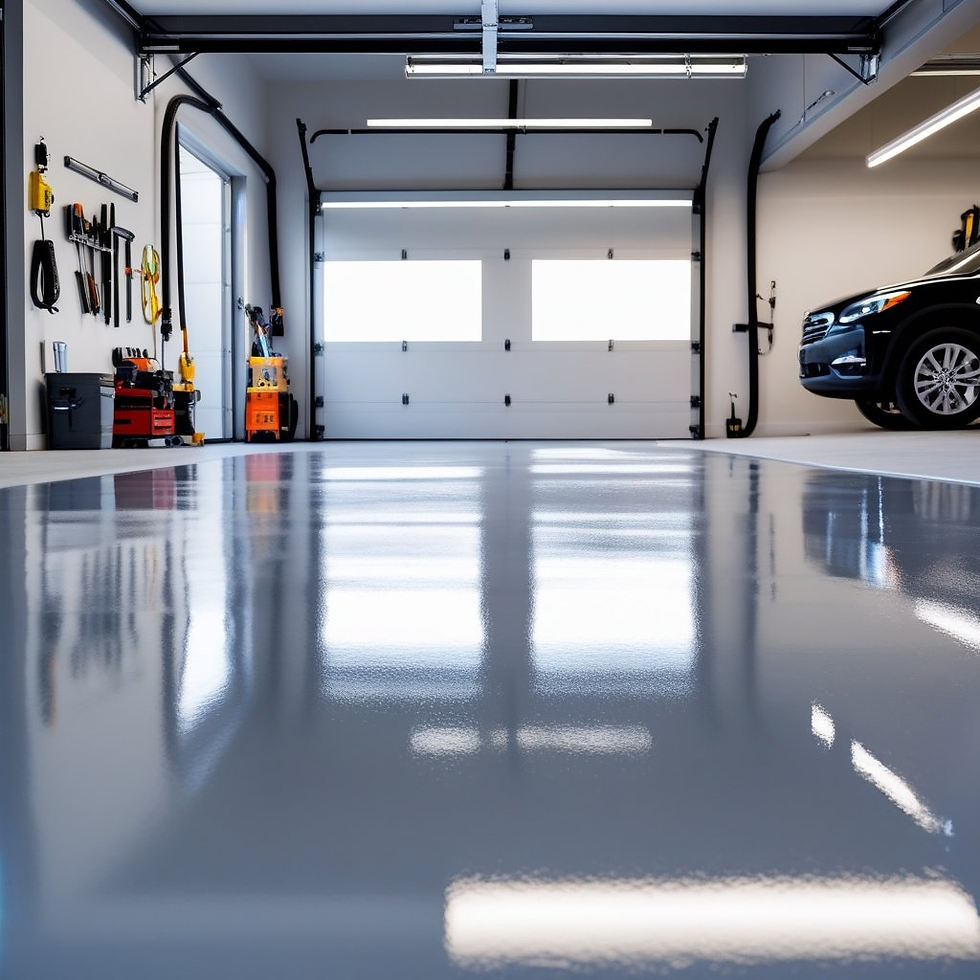Epoxy Garage Floor Cost in 2025: Complete Pricing Guide, Factors, and Installation Tips
- Jayant Upadhyay
- Aug 12, 2025
- 4 min read

Table of Contents
Introduction
What Is an Epoxy Garage Floor?
Why Homeowners Choose Epoxy Flooring
Average Epoxy Garage Floor Cost in 2025
Factors That Influence Epoxy Flooring Cost
Cost Comparison: DIY vs. Professional Installation
Epoxy Types and Their Price Ranges
Epoxy Garage Floor Cost by Size
Regional Price Differences in the US
Additional Costs to Consider
How to Save Money on Epoxy Garage Floors
Mistakes That Can Increase Your Costs
How Long Do Epoxy Garage Floors Last?
Is Epoxy Worth the Cost?
FAQs
Final Thoughts
Introduction
Garage floors take a lot of abuse — from hot tires and oil spills to heavy toolboxes and dropped equipment. Over time, unprotected concrete can stain, crack, and deteriorate. Epoxy flooring offers a durable, attractive, and cost-effective way to protect and upgrade your garage floor.
But how much does an epoxy garage floor cost in 2025? Prices can vary widely depending on the size of your garage, the type of epoxy used, labor rates, and whether you choose a DIY or professional installation. This guide will break down every cost factor so you can budget confidently.
What Is an Epoxy Garage Floor?
An epoxy garage floor is a surface coating made from a combination of resin and hardener that chemically bonds to the concrete floor, creating a durable, glossy, and often decorative finish.
Epoxy coatings can:
Resist stains, chemicals, and moisture
Withstand heavy vehicle traffic
Offer customizable colors, flakes, and patterns
Last for 10–20 years with proper maintenance
Why Homeowners Choose Epoxy Flooring
Benefits include:
Durability: Protects concrete from wear and tear
Aesthetics: Offers sleek, customizable finishes
Easy Maintenance: Wipes clean with minimal effort
Increased Home Value: Attractive garages can impress buyers
Slip Resistance: Optional additives improve traction
Average Epoxy Garage Floor Cost in 2025
In 2025, the average cost of an epoxy garage floor in the US is:
DIY Installation: $3–$7 per square foot
Professional Installation: $5–$15 per square foot
For a 2-car garage (around 400–500 sq. ft.):
DIY: $1,200 – $3,500
Professional: $2,000 – $7,500
Factors That Influence Epoxy Flooring Cost
Garage Size – Larger garages cost more overall but less per square foot.
Epoxy Type – 100% solids epoxy is pricier than water-based.
Concrete Condition – Cracks, moisture, or oil stains require repair.
Customization – Decorative flakes, metallic effects, and color blends add cost.
Labor Rates – Vary by region and contractor experience.
Coating Thickness – Thicker applications improve durability but cost more.
Cost Comparison: DIY vs. Professional Installation
Feature | DIY | Professional |
Price per sq. ft. | $3–$7 | $5–$15 |
Equipment included? | No | Yes |
Skill required | High | Low (you hire the skill) |
Durability | Often less | Higher with proper prep |
Warranty | None | Often 5–15 years |
Verdict: DIY is cheaper upfront, but professionals often achieve longer-lasting results.
Epoxy Types and Their Price Ranges
Water-Based Epoxy: $30–$50 per gallon; $3–$7/sq. ft. installed
Solvent-Based Epoxy: $45–$75 per gallon; $4–$9/sq. ft. installed
100% Solids Epoxy: $70–$120 per gallon; $6–$15/sq. ft. installed
Metallic Epoxy: $8–$16/sq. ft. installed
Epoxy Flake Flooring: $5–$12/sq. ft. installed
8. Epoxy Garage Floor Cost by Size
Garage Size | DIY Cost | Professional Cost |
1-car (250 sq. ft.) | $750–$1,750 | $1,250–$3,750 |
2-car (400–500 sq. ft.) | $1,200–$3,500 | $2,000–$7,500 |
3-car (750 sq. ft.) | $2,250–$5,250 | $3,750–$11,250 |
Regional Price Differences in the US
Northeast: $6–$14/sq. ft. (higher labor costs)
Midwest: $5–$11/sq. ft.
South: $4–$10/sq. ft. (more competitive pricing)
West Coast: $6–$15/sq. ft. (higher cost of living)
Additional Costs to Consider
Concrete repairs: $50–$250+ depending on damage
Moisture barrier installation: $0.50–$1.50/sq. ft.
Decorative flakes: $1–$2/sq. ft.
Slip-resistant additives: $0.25–$0.75/sq. ft.
How to Save Money on Epoxy Garage Floors
Prep the concrete yourself before hiring a pro
Choose a simpler color and finish
Book during off-season months (winter in warm states)
Get quotes from at least 3 installers
Buy materials during seasonal sales
Mistakes That Can Increase Your Costs
Skipping concrete moisture testing
Not filling cracks before coating
Applying epoxy in humid or cold conditions
Using cheap, thin coatings that wear quickly
How Long Do Epoxy Garage Floors Last?
With professional installation and proper maintenance, epoxy floors last:
DIY: 5–8 years
Professional: 10–20 years
Is Epoxy Worth the Cost?
If you want a durable, attractive, and low-maintenance garage floor, epoxy is one of the best investments. While the upfront cost can be significant, its lifespan and benefits often outweigh cheaper short-term fixes.
FAQs
Q1: How long does epoxy garage floor installation take?
A: Typically 2–5 days depending on prep work and curing time.
Q2: Can epoxy be applied over painted concrete?
A: No — old paint must be removed for proper adhesion.
Q3: Will hot tires damage epoxy floors?
A: High-quality epoxy resists tire marks; cheaper coatings may not.
Q4: Is epoxy slippery when wet?
A: Yes, unless slip-resistant additives are used.
Q5: Can I install epoxy in cold weather?
A: Most epoxy should be applied at 55–90°F for best results.
Q6: How do I clean epoxy floors?
A: Use mild soap and water; avoid abrasive cleaners.
Q7: Can epoxy floors crack?
A: Epoxy itself won’t crack, but cracks in the underlying concrete can show through.
Q8: Do epoxy floors have fumes?
A: Solvent-based epoxy has strong fumes; ensure good ventilation.
Q9: Can I change the color later?
A: Yes, but it requires sanding the surface and reapplying epoxy.
Q10: Are epoxy garage floors eco-friendly?
A: Water-based epoxies have lower VOCs and are more environmentally friendly.
Final Thoughts
Epoxy garage floors are a smart choice for homeowners who value durability, style, and low maintenance. Costs vary based on your garage size, desired finish, and installation method — but whether you go DIY or hire a pro, epoxy delivers long-term value.



Comments